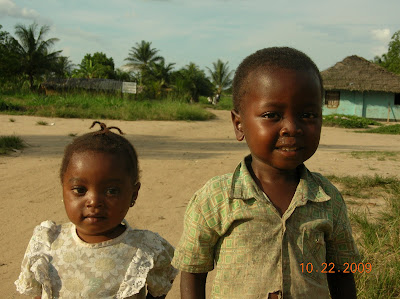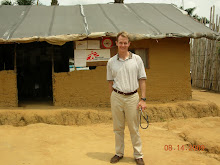
A wonderful, varied, and puzzling aspect of life here in Lubutu is the greetings. The Congolese are very polite. When passing me on the street, the vast majority smile and offer both a physical and verbal acknowledgement.
As in most parts of the world, the physical greetings are usually a wave or handshake. The one handed wave is the most common. A special treat is the two handed Congolese wave. Both palms outwards and a broad smile. It's enthusiastic and welcoming. A few people don't wave, but it is uncommon. Even this group makes some effort, smiling or nodding their heads instead. The extremely polite are more common; several men have tipped their hats as they pass.
Most physical gestures are coupled with verbal greetings, which are more varied. Most common are "bonjour" (before 1 p.m.), "bon après-midi" (1-2 p.m.) and "bonsoir" (after 2 p.m.). Less often I hear "jambo" (Swahili for "hello"). "Karibu" is nice, meaning "welcome."
Young children's verbal greetings are incredibly diverse. By far their most common way to say "hello" is to scream "MONUC!" Puzzling? The Mission de Organisation des Nations Unies en République Démocratique du Congo is the UN Peacekeeping force. It has been in this country for over a decade. In the minds of the local children, all white people logically work for the UN. There must be an assumption that these same white people wish to hear the name of their employer shouted by children, accompanied by jumping, smiling, and waving. It's cute but strange. Being in an MSF vehicle or wearing MSF t-shirts makes no difference. "MONUC" rules.
Stranger yet are the children screaming "Good MONUC!" This must have originally been "Good morning" and was merged with "MONUC!" The result is an approbation of international peacekeeping interventions shouted by innumerable Congolese kids.
Unlike most places in the world I have travelled, I never hear the word "hello." This, despite my American accented French betraying my anglophone origins.
Regardlesss of the specific nature of the greeting, it is the culture here to always acknowledge another person as one passes by. As I walk around town, I am continually saying "bonjour", waving, and nodding. I can't help but think how shocking it must be for a Congolese person who visits or immigrates to Europe or the US. In these places people rush past one another, sometimes bumping into one another, without any exchange whatsoever. For a Congolese, the silence would be deafening.

Very sorry to hear about the loss of your job, Douglas. You have to hope that it will all turn out for the best. It really doesn't sound like the sort of practice you would have wanted to stay with anyway.
ReplyDeleteI can understand why you have been feeling a bit down - perhaps the time to eat some more chocolate?
Regards from us both
Margaret and David